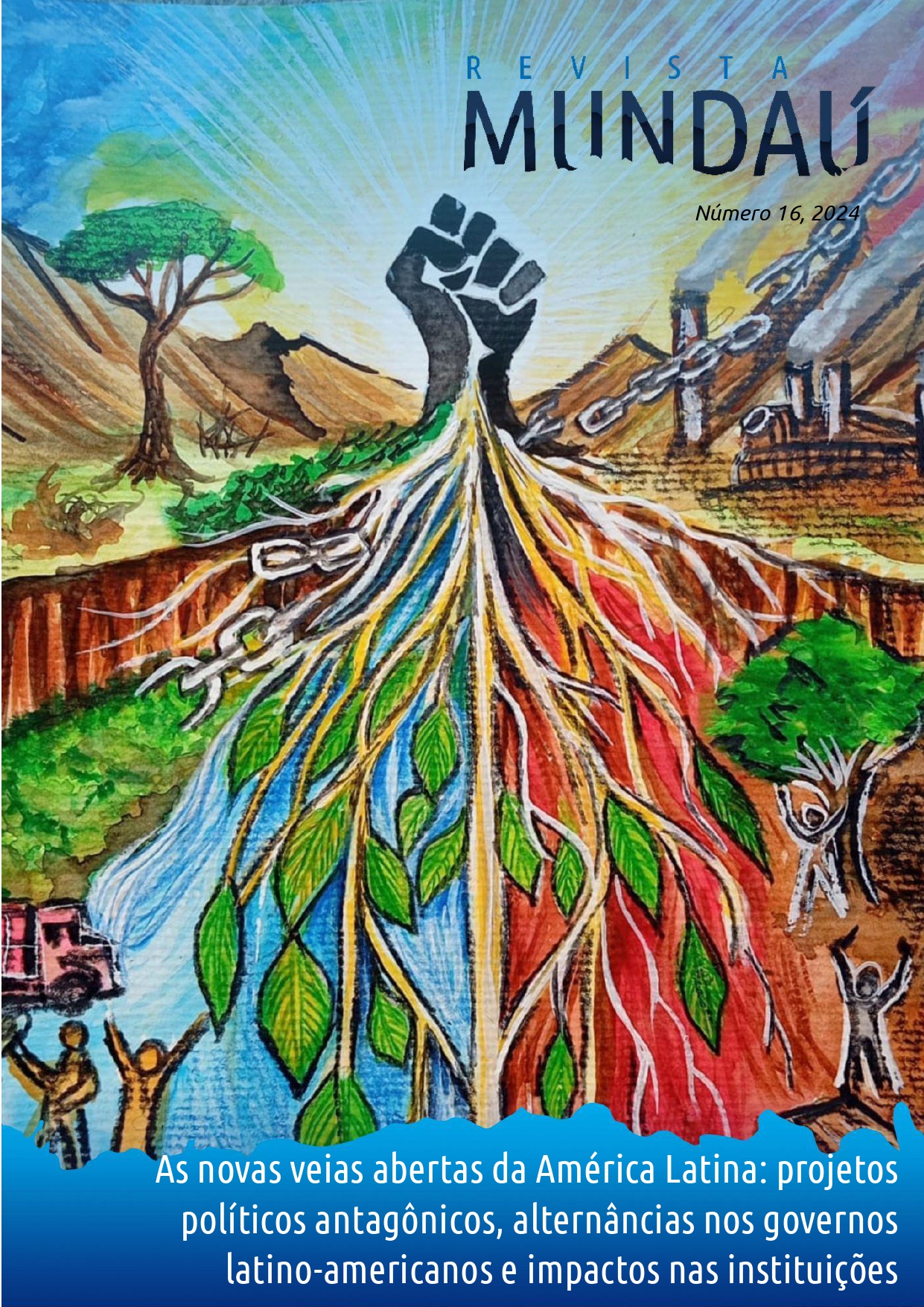Militares y estrategias políticas no convencionales en Brasil: configurando parámetros para una toma del poder del Estado
DOI:
https://doi.org/10.28998/rm.2024.n.16.17795Palabras clave:
Militares, Política, Guerra híbrida, Elecciones, BolsonaroResumen
Este artículo tiene como objetivo analizar las formas en que los militares produjeron la candidatura de Jair Bolsonaro a la Presidencia en 2018, observando que la opción de lanzarlo a ese cargo se inauguró en 2014 dentro de un establishment militar. Considerando que Bolsonaro (y su entonces vicepresidente) eran militares, mi intención es recuperar el vínculo entre esta acción política y una acción militar en sí misma, operando dentro de la lógica de la guerra. Para ello utilizo una categoría nativa que comenzó a circular entre los militares brasileños precisamente en 2014, la de “guerra híbrida”. Un rápido repaso de cómo fue concebido desde sus primeros usos, a mediados de la década de 2000, sugiere que algunos de sus aspectos fueron utilizados de forma inédita aquí en Brasil.
Descargas
Citas
ALONSO, Angela. A política das ruas: protestos em São Paulo de Dilma a Temer. Novos Estudos Cebrap, número especial, p. 49-58, 2017.
AVRITZER, Leonardo; KERCHE, Fábio; MARONA, Marjorie (Orgs.). Governo Bolsonaro: retrocesso democrático e degradação política. Belo Horizonte: Autêntica, 2021.
BATESON, Gregory. Naven. Stanford: Stanford University Press, 1958.
BEN-ARI, Eyal. Mastering soldiers: conflict, emotions, and the enemy in an Israeli military unit. Oxford: Berghahn, 1998.
BEN-ARI, Eyal et al. Rethinking Contemporary Warfare. New York: State University of New York, 2010.
BOYD, John R. The essence of winning and losing. Unpublished lecture notes, v. 12, n. 23, p. 123-125, 1996.
CASTRO, Celso. General Villas Bôas: conversa com o comandante. Rio de Janeiro: FGV, 2021.
CESARINO, Leticia. Ethnography of refracted publics: from digital populism to alt-science ecosystems. Paper presented at the “Friday Seminars”, LSE, 28 may 2021. Mimeo.
CLAUSEWITZ, Carl Von. On war. Princeton: Princeton University Press, 2008.
CORAM, Robert. Boyd: The fighter pilot who changed the art of war. New York: Little, Brown & Co., 2002.
DENT, Alexander S.; MACHADO, Rosana Pinheiro. Protesting democracy in Brazil. Society for Cultural Anthropology Hot Spots. December 20, 2013. Disponível em: https://culanth.org/fieldsights/426-protesting-democracy-in-brazil. Acesso em: 6 dez. 2024.
DUNLAP, Charles. Law and Military Interventions: preserving humanitarian values in 21st century conflicts. Working Paper. Cambridge: Harvard University (John F. Kennedy School of Government), 2001.
ENGDAHL, William. Full Spectrum Dominance: Totalitarian Democracy in the New World Order. Wiesbaden: Edition Engdahl, 2009.
ESCOBAR, Pepe. O Brasil no epicentro da Guerra Híbrida, Pepe Escobar. GGN: O Jornal de Todos os Brasis, 7 de Junho de 2016. Disponível em: https://jornalggn.com.br/analise/o-brasil-no-epicentro-da-guerra-hibrida-por-pepe-escobar/. Acesso em: 6 dez. 2024.
FORD, Daniel. A vision so noble: John Boyd, the OODA Loop, and America’s War on Terror. Durham: Warbird Books, 2010.
GONZÁLEZ, Roberto J. ‘Human terrain’: Past, present and future applications. Anthropology Today, v. 24, n. 1, p. 21-26, 2008.
GRAHAM, Stephen. Cities Under Siege: The new military urbanism. London: Verso, 2010.
HOFFMAN, Frank. Conflict in the 21st century: The rise of the hybrid wars. Arlington: Potomac Institute for Policy Studies, 2007.
KORYBKO, Andrew. Hybrid wars: The indirect adaptive approach to regime change. Moscow: PFUR, 2015.
LEIRNER, Piero. O Brasil no Espectro de uma Guerra Híbrida: militares, operações psicológicas e política em uma perspectiva etnográfica. 2ª ed. São Paulo: Alameda, 2022 [2020].
LEIRNER, Piero. Ensaio sobre 2013 e uma Guerra Híbrida Fora de Lugar. R@U: Revista de Antropologia da UFSCar, v. 15, n. 1, p. 142-200, 2023.
LIANG, Qiao; XIANGSUI, Wang. Unrestricted Warfare. Beijing: PLA Literature and Arts Publishing House, 1999.
LIND, William S. Fourth-generation warfare's first blow: a quick look. Marine Corps Gazette, v. 85, n. 11, p. 72-72, 2001.
MAYA; Romulus; LEIRNER, Piero. Urgente: EUA planejam derrubar avião brasileiro e culpar Venezuela? Duplo Expresso. 16 mai. de 2019. Disponível em: https://duploexpresso.com/?p=104661. Acesso em: 6 dez. 2024.
MATTIS, James N.; HOFFMAN, Frank. Future warfare: The rise of hybrid wars. Proceedings-United States Naval Institute, v. 131, n. 11, p. 18, 2005.
NCA - Network of Concerned Anthropologists. The counter-counterinsurgency manual; or, Notes on demilitarizing American society. Chicago: Prickly Paradigm Press, 2009.
OSINGA, Frans. Science, strategy and war: The strategic theory of John Boyd. Delft: Eburon Academic Publishers, 2005. Disponível em: http://chicagoboyz.net/blogfiles/OsingaBoydThesis.pdf. Acesso em: 6 dez. 2024.
PRICE, David H. Weaponizing anthropology. Petrolia: CounterPunch, 2011.
RICHARDS, Chet. Boyd’s OODA Loop (it’s not what you think). March 21, 2012.Disponível em: https://www.academia.edu/26030432/Boyds_OODA_Loop_Its_Not_What_You_Think_Introduction_A_Non-school_of_Strategy. Acesso em: 6 dez. 2024.
RODRIGUES, Thiago. Narcotráfico, militarização e pacificações: novas securitizações no Brasil. In: PASSOS, Rodrigo; FUCCILE, Alexandre (Org.). Visões do Sul: crise e transformações do sistema internacional. Volume 2. Marília: Oficina Universitária; São Paulo: Cultura Acadêmica, 2016. p. 55-87.
SSORIN-CHAIKOV, Nikolai. Hybrid peace: Ethnographies of war. Annual Review of Anthropology, v. 47, n. 1, p. 251-262, 2018.
SZAFRANSKI, Richard. Neocortical warfare? The acme of skill. Santa Monica: RAND Corporation, 1994. Disponível em: http://www.rand.org/content/dam/rand/pubs/monograph_reports/MR880/MR880.ch17.pdf. Acesso em: 6 dez. 2024.
VIRILIO, Paul. Velocidade e política. São Paulo: Estação Liberdade, 1997.
VIRILIO, Paul; LOTRINGER, Sylvère. Pure war. Los Angeles: Semiotext(e), 2003.
WEIZMAN, Eyal. Walking Through Walls: Soldiers as architects in the Israeli–Palestinian conflict. Radical Philosophy, 2006. Disponível em: https://www.radicalphilosophy.com/article/walking-through-walls. Acesso em: 6 dez. 2024.
WEIZMAN, Eyal. Hollow land: Israel’s architecture of occupation. London: Verso, 2007.
ZANIN, Cristiano; MARTINS, Waleska; VALIM, Rafael. Lawfare: uma introdução. São Paulo: Contracorrente, 2020.








